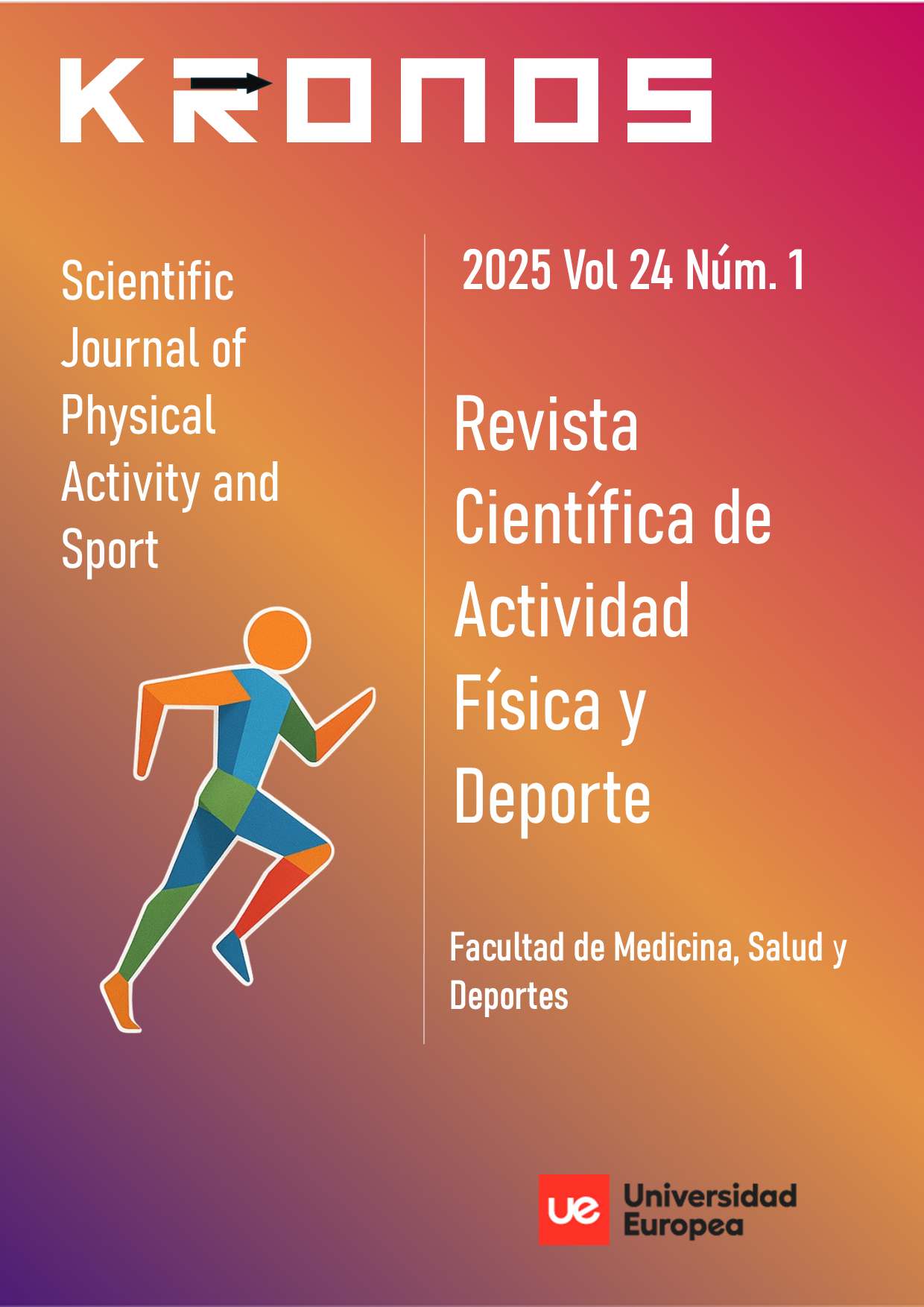Isometric strength profile of the posterior chain in professional soccer players from the Colombian league
DOI:
https://doi.org/10.64197/Kronos.24.1.999Keywords:
hamstrings, isometric strength, soccer, injuries, force platesAbstract
Introduction: it has been shown that in professional soccer players the use of tests and measurements for the analysis of neuromuscular strength and fatigue has significant effects in the identification of abnormalities as a risk factor for the onset of muscle injuries. In the literature it has been shown that the isometric strength test of the posterior chain (IPC-F) performed on force plates at 90° of the hip and knee has sensitivity indices in the peaks of relative strength, neuromuscular fatigue and effective recovery as an essential analysis element in high performance soccer players.
Methodology: descriptive study in 31 professional soccer players of the Colombian league (Age 19 ± 13 years; Height 170 ± 14 cm; weight 65 ± 12 kg) where strength measurement in Newton was performed with the IPC-F 90 ° test using the ForceDecks device from the company VALD Performance.
Results: statistical values were obtained for the total posterior chain IPC-F template on the left side, averaging 73N±16N with a range between 50N and 102N, and for the right side, averaging 76N±18N with a range between 45N and 124N with an asymmetry less than 10%.
Conclusions: the hamstring strength profile in professional soccer players allows the generation of statistical data related to biomechanical variables of movement involved in performance, such as force production rate, maximum peak force, velocity, and torque. The IPC-F test is a standardized test for the evaluation of isometric hamstring strength.
Downloads
References
Barker, L. A., Harry, J. R., & Mercer, J. A. (2018). Relationships Between Countermovement Jump Ground Reaction Forces and Jump Height, Reactive Strength Index, and Jump Time. J Strength Cond Res, 32(1), 248-254. https://doi.org/10.1519/jsc.0000000000002160
Blanch, P., & Gabbett, T. J. (2016). Has the athlete trained enough to return to play safely? The acute:chronic workload ratio permits clinicians to quantify a player's risk of subsequent injury. Br J Sports Med, 50(8), 471-475. https://doi.org/10.1136/bjsports-2015-095445
Bourne, M. N., Opar, D. A., Williams, M. D., & Shield, A. J. (2015). Eccentric Knee Flexor Strength and Risk of Hamstring Injuries in Rugby Union: A Prospective Study. Am J Sports Med, 43(11), 2663-2670. https://doi.org/10.1177/0363546515599633
Bramah, C., Mendiguchia, J., Dos'Santos, T., & Morin, J. B. (2024). Exploring the Role of Sprint Biomechanics in Hamstring Strain Injuries: A Current Opinion on Existing Concepts and Evidence. Sports Med, 54(4), 783-793. https://doi.org/10.1007/s40279-023-01925-x
Buchheit, M., Mendez-Villanueva, A., Simpson, B. M., & Bourdon, P. C. (2010). Match running performance and fitness in youth soccer. Int J Sports Med, 31(11), 818-825. https://doi.org/10.1055/s-0030-1262838
Campbell, P. G., Stewart, I. B., Sirotic, A. C., Drovandi, C., Foy, B. H., & Minett, G. M. (2021). Analysing the predictive capacity and dose-response of wellness in load monitoring. J Sports Sci, 39(12), 1339-1347. https://doi.org/10.1080/02640414.2020.1870303
Claudino, J. G., Cardoso Filho, C. A., Bittencourt, N. F. N., Gonçalves, L. G., Couto, C. R., Quintão, R. C.,…Serrão, J. C. (2021). Eccentric Strength Assessment of Hamstring Muscles with New Technologies: a Systematic Review of Current Methods and Clinical Implications. In Sports Med Open (Vol. 7, pp. 10). https://doi.org/10.1186/s40798-021-00298-7
Cohen, D. D., Zhao, B., Okwera, B., Matthews, M. J., & Delextrat, A. (2015). Angle-specific eccentric hamstring fatigue after simulated soccer. Int J Sports Physiol Perform, 10(3), 325-331. https://doi.org/10.1123/ijspp.2014-0088
Collings, T. J., Lima, Y. L., Dutaillis, B., & Bourne, M. N. (2024). Concurrent validity and test-retest reliability of VALD ForceDecks' strength, balance, and movement assessment tests. J Sci Med Sport, 27(8), 572-580. https://doi.org/10.1016/j.jsams.2024.04.014
Collins, J., Maughan, R. J., Gleeson, M., Bilsborough, J., Jeukendrup, A., Morton, J. P.,…McCall, A. (2021). UEFA expert group statement on nutrition in elite football. Current evidence to inform practical recommendations and guide future research. Br J Sports Med, 55(8), 416. https://doi.org/10.1136/bjsports-2019-101961
Constantine, E., Taberner, M., Richter, C., Willett, M., & Cohen, D. D. (2019). Isometric Posterior Chain Peak Force Recovery Response Following Match-Play in Elite Youth Soccer Players: Associations with Relative Posterior Chain Strength. Sports (Basel), 7(10). https://doi.org/10.3390/sports7100218
Eythorsdottir, I., Gløersen, Ø., Rice, H., Werkhausen, A., Ettema, G., Mentzoni, F.,…Paulsen, G. (2024). The Battle of the Equations: A Systematic Review of Jump Height Calculations Using Force Platforms. Sports Med, 54(11), 2771-2791. https://doi.org/10.1007/s40279-024-02098-x
Gabbett, T. J. (2020). Debunking the myths about training load, injury and performance: empirical evidence, hot topics and recommendations for practitioners. Br J Sports Med, 54(1), 58-66. https://doi.org/10.1136/bjsports-2018-099784
Gabbett, T. J., Nassis, G. P., Oetter, E., Pretorius, J., Johnston, N., Medina, D.,…Ryan, A. (2017). The athlete monitoring cycle: a practical guide to interpreting and applying training monitoring data. In Br J Sports Med (Vol. 51, pp. 1451-1452). https://doi.org/10.1136/bjsports-2016-097298
Matinlauri, A., Alcaraz, P. E., Freitas, T. T., Mendiguchia, J., Abedin-Maghanaki, A., Castillo, A.,…Cohen, D. D. (2019). A comparison of the isometric force fatigue-recovery profile in two posterior chain lower limb tests following simulated soccer competition. PLoS One, 14(5), e0206561. https://doi.org/10.1371/journal.pone.0206561
McCall, A., Nedelec, M., Carling, C., Le Gall, F., Berthoin, S., & Dupont, G. (2015). Reliability and sensitivity of a simple isometric posterior lower limb muscle test in professional football players. J Sports Sci, 33(12), 1298-1304. https://doi.org/10.1080/02640414.2015.1022579
Mendiguchia, J., Castaño-Zambudio, A., Jiménez-Reyes, P., Morin, J. B., Edouard, P., Conceição, F.,…Colyer, S. L. (2022). Can We Modify Maximal Speed Running Posture? Implications for Performance and Hamstring Injury Management. Int J Sports Physiol Perform, 17(3), 374-383. https://doi.org/10.1123/ijspp.2021-0107
Morgans, R., Di Michele, R., & Drust, B. (2018). Soccer Match Play as an Important Component of the Power-Training Stimulus in Premier League Players. Int J Sports Physiol Perform, 13(5), 665-667. https://doi.org/10.1123/ijspp.2016-0412
Nedelec, M., McCall, A., Carling, C., Legall, F., Berthoin, S., & Dupont, G. (2014). The influence of soccer playing actions on the recovery kinetics after a soccer match. J Strength Cond Res, 28(6), 1517-1523. https://doi.org/10.1519/jsc.0000000000000293
Neupert, E., Gupta, L., Holder, T., & Jobson, S. A. (2022). Athlete monitoring practices in elite sport in the United Kingdom. J Sports Sci, 40(13), 1450-1457. https://doi.org/10.1080/02640414.2022.2085435
Opar, D. A., Ruddy, J. D., Williams, M. D., Maniar, N., Hickey, J. T., Bourne, M. N.,…Timmins, R. G. (2022). Screening Hamstring Injury Risk Factors Multiple Times in a Season Does Not Improve the Identification of Future Injury Risk. Med Sci Sports Exerc, 54(2), 321-329. https://doi.org/10.1249/mss.0000000000002782
Opar, D. A., Timmins, R. G., Behan, F. P., Hickey, J. T., van Dyk, N., Price, K., & Maniar, N. (2021). Is Pre-season Eccentric Strength Testing During the Nordic Hamstring Exercise Associated with Future Hamstring Strain Injury? A Systematic Review and Meta-analysis. Sports Med, 51(9), 1935-1945. https://doi.org/10.1007/s40279-021-01474-1
Opar, D. A., Williams, M. D., & Shield, A. J. (2012). Hamstring strain injuries: factors that lead to injury and re-injury. Sports Med, 42(3), 209-226. https://doi.org/10.2165/11594800-000000000-00000
Opar, D. A., Williams, M. D., Timmins, R. G., Hickey, J., Duhig, S. J., & Shield, A. J. (2015). Eccentric hamstring strength and hamstring injury risk in Australian footballers. Med Sci Sports Exerc, 47(4), 857-865. https://doi.org/10.1249/mss.0000000000000465
Read, P. J., Turner, A. N., Clarke, R., Applebee, S., & Hughes, J. (2019). Knee Angle Affects Posterior Chain Muscle Activation During an Isometric Test Used in Soccer Players. Sports (Basel), 7(1). https://doi.org/10.3390/sports7010013
Robles-Palazón, F. J., López-Valenciano, A., De Ste Croix, M., Oliver, J. L., García-Gómez, A., Sainz de Baranda, P., & Ayala, F. (2022). Epidemiology of injuries in male and female youth football players: A systematic review and meta-analysis. J Sport Health Sci, 11(6), 681-695. https://doi.org/10.1016/j.jshs.2021.10.002
Timmins, R. G., Bourne, M. N., Shield, A. J., Williams, M. D., Lorenzen, C., & Opar, D. A. (2016). Short biceps femoris fascicles and eccentric knee flexor weakness increase the risk of hamstring injury in elite football (soccer): a prospective cohort study. Br J Sports Med, 50(24), 1524-1535. https://doi.org/10.1136/bjsports-2015-095362
Windt, J., MacDonald, K., Taylor, D., Zumbo, B. D., Sporer, B. C., & Martin, D. T. (2020). "To Tech or Not to Tech?" A Critical Decision-Making Framework for Implementing Technology in Sport. J Athl Train, 55(9), 902-910. https://doi.org/10.4085/1062-6050-0540.19
Wollin, M., Thorborg, K., & Pizzari, T. (2017). The acute effect of match play on hamstring strength and lower limb flexibility in elite youth football players. Scand J Med Sci Sports, 27(3), 282-288. https://doi.org/10.1111/sms.12655
Downloads
Published
Versions
- 2025-07-28 (2)
- 2025-07-28 (1)
How to Cite
Issue
Section
License
Copyright (c) 2025 Carolina Martínez Jarandilla, Isidro Lapuente Álvarez

This work is licensed under a Creative Commons Attribution 4.0 International License.











